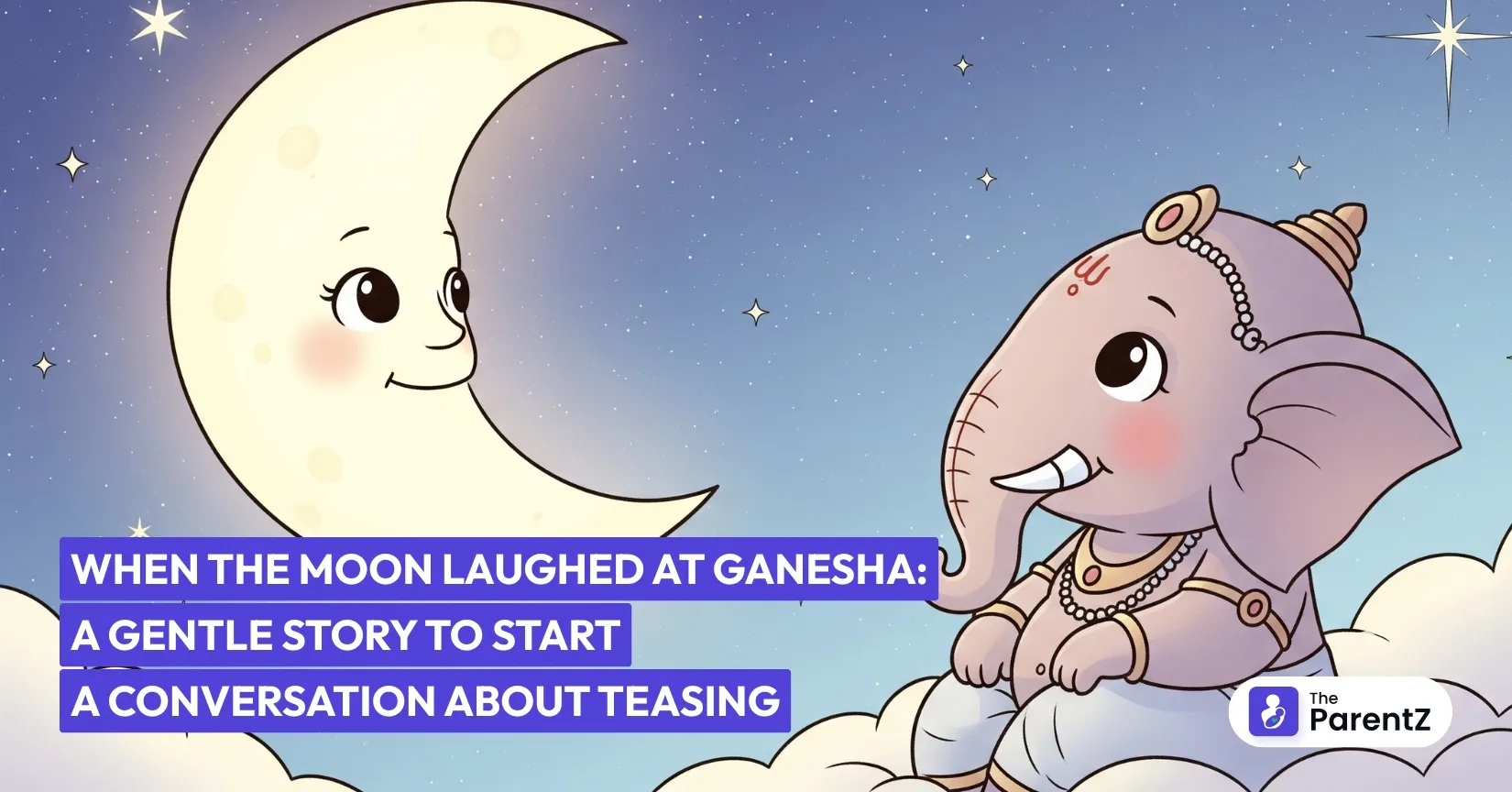Every parent has had to comfort their child after they’ve been teased. Sometimes children laugh at each other’s mistakes, or make fun of how someone looks, or giggle when a friend falls over. It seems small at first, but teasing can hurt little hearts deeply.
Our traditions give us stories to help teach children why teasing is wrong, and what happens when words are used to mock rather than to care. One such story is when the Moon laughed at Ganesha. This isn’t just a tale about gods and the heavens; it’s a story that children can easily relate to, and it’s one parents can use to open a warm conversation about kindness.
The Feast of Modakas
It was Ganesha’s birthday, and there was a grand feast. The tables were filled with His favorite food, delicious modakas. Ganesha adored modakas and ate more than His fill.
Full and happy, He decided to take a little ride on His mouse, Mooshika, to get some fresh air. The night was bright with the glowing full moon above. All seemed calm.
A Fall and a Laugh
Suddenly, a serpent slithered across the path. Mooshika got scared, stumbled, and Ganesha fell off! In that fall, all the modakas He had lovingly collected tumbled onto the ground.
Ganesha quickly gathered them, dusted Himself off, tied the snake around His tummy like a belt so the modakas wouldn’t spill again, and hoped no one had seen.
But someone had. The bright Moon, Chandra Deva, saw it all. And instead of kindness, the Moon laughed. He laughed loudly at Ganesha’s fall and His big belly.
Ganesha’s Hurt and Anger
Like any child who has been laughed at, Ganesha felt hurt and angry. He looked up at the Moon and said, “Chandra! You think you are so perfect, so handsome, so bright, that you can laugh at others. Today I curse you! From now on, no one shall see your proud face. You will disappear from the sky.”
Suddenly, the heavens turned dark. Without the Moon, there was chaos in both heaven and earth.
Forgiveness and a Lesson
The Moon was shaken. His laughter had brought him trouble. He realized he had been vain and unkind. He went to Ganesha, bowed, and begged forgiveness.
Ganesha, whose heart is always large and compassionate, forgave him. But a curse cannot be taken back completely. So Ganesha softened it. He said, “You will wax and wane. You will appear in full glory only once a month, and one night you will remain hidden.”
The Moon accepted this with gratitude. But Ganesha also added: “Because you laughed at me on Chaturthi, anyone who looks at the Moon on that day will face difficulties.” That is why, even today, we are told not to look at the Moon on Ganesh Chaturthi.
What Parents Can Teach Their Children
This story is very close to daily life. Let’s see how:
1. Teasing Hurts More Than We Think
Just as the Moon’s laughter hurt Ganesha, a child’s laughter at someone’s fall, mistake, or appearance can cut deeply. Parents can use this story to gently explain that teasing is not harmless; it can wound someone’s heart.
2. Pride Leads Us to Mock Others
The Moon thought of himself as flawless, beautiful, and bright. Pride made him thoughtless. Children, too, may boast about being the fastest runner, the tallest, or the cleverest, and this pride may lead them to tease others. This story helps us remind them that real strength is always humble.
3. Everyone Falls Sometimes
Even Lord Ganesha stumbled and fell! It shows us that everyone makes mistakes, everyone trips or loses balance sometimes. Laughing at someone’s fall means forgetting that tomorrow we could fall too.
4. Forgiveness Brings Peace
Though angry, Ganesha forgave the Moon when he truly repented. This is equally important for children; to know that if they have teased someone, they can say sorry, and if they have been teased, they can forgive.
Making the Story Real for Your Child
Next time your child comes home upset because someone laughed at them, hold them close and tell them, “Even Lord Ganesha was teased by the Moon. But he forgave. And he reminded us never to laugh cruelly at others.”
And when your child accidentally laughs at someone else, remind them, “Remember the Moon? His laughter caused him trouble. Let’s be kinder instead.”
This way, the story becomes more than history; it becomes part of their everyday guidance.
Conclusion
The tale of Ganesha and the Moon is not about curses and the moonlight alone. It is about teasing, pride, and the healing power of forgiveness. It tells our children that mocking others is never the right path, and that kindness and humility keep hearts shining brighter than the Moon itself.
May this story remind us all, parents and children, that laughter should lift people up, never pull them down.





Be the first one to comment on this story.